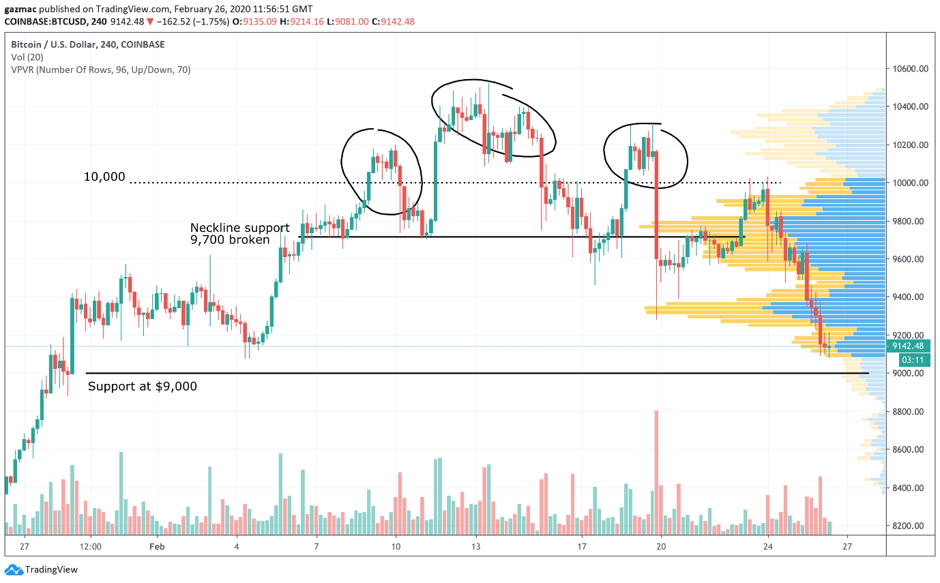Bitcoin’s extended sell-off and latest crypto news
Hacks, a plunging bitcoin, Fcoin exchange implosion, Binance trouble…and some good news too.
27th February 2020 13:49
by Gary McFarlane from interactive investor
Hacks, a plunging bitcoin, Fcoin exchange implosion, Binance trouble…and some good news too.

Bitcoin is not a safe haven. Or at least not when it comes to coronavirus.
The happy correlation of bitcoin with traditional flight to safety assets such as gold, has been undone this past week, with bitcoin at the time of writing priced at $9,100.
The leading digital currency had climbed to the $10,000 mountain top but the air was too thin to stay the course.
Bitcoin pushed higher through the psychologically important $10,000 mark on 9 February, reinforcing the bullish optimism that has characterised this year’s trading.
The price in total made three sojourns above $10,000, creating a weakly defined head and shoulders patterns, with the head formed from the year to date high at $10,500. The price alternated between giving up the summit and reclaiming it.
The virtual currency seemed to confirm support around $9,500 up until this week but was confirming bullish exhaustion as it made heavy work attempting to reach $10,000 in nevertheless positive trading over the past weekend.
Volatile trading had seen the top digital currency drop as lows as $9,280 and it has now fallen through that level.
The price downturn typically presaged by a head and shoulders pattern has come to pass and bitcoin is dragging down the rest of the market.
Overall market capitalisation has fallen back to where we were on 5 February, at $259 billion. Over the past seven days $36 billion has been wiped off crypto market valuation, according to coinmarketcap.com.
It has now lost support at $9,700, $9,500, and lately $9,000 (see chart below).

(BTCUSD 4-hour candles on Coinbase, 26 February 2020, courtesy TradingView)
Aside from the technical considerations of the fight between bulls and bears, the speed of bitcoin’s initial advance past $10,000 has invited profit-taking, but that’s probably not the whole story.
The breakdown in the correlation between bitcoin and gold – the yellow metal is trading at a seven-year high of $1,649 – may have been helped by some negative developments in the crypto space over the past couple of weeks, providing bears with more excuses to sell and bulls with reasons to take profits.
Sentiment in crypto is brittle at the best of times, so it often doesn’t take much to shift the market’s direction.
Fcoin exchange implosion
When a major exchange catering to Chinese traders went offline with $130 million of investors’ money it jolted the market.
On 10 February the exchange announced it would be reducing the supply of the token by 720 million– a practice known as burning. The price of Fcoin went up briefly and then the site was shut down, with the exchange’s owner accused of instigating a ‘pump and dump’.
Fcoin was founded by Jian Zhang. He is something of a darling of the Chinese crypto community as one of the early adopters. He was involved in developing popular block explorer and wallet apps as well as at one time being the chief technical officer at the Huobi exchange.
The exchange, which began operation in January 2018, at one point claimed to have the largest trading volume of any exchange.
Similarly to some other exchanges, Fcoin has its own coin (of the same name) and many of its users owned it, which allowed the exchange to describe itself as being owned by its community.
Zhang has published a letter following the shuttering of the exchange saying that the $130 million would be reimbursed to and that the problems at the exchange were all down to technical issues.
A report by Anchain.AI, which has examined chain transactions, claims that the exchange’s cold wallet (where most of the customer funds would have been kept in offline storage) was emptied and funds moved to Gate.io, Binance, OKEx and Huobi exchanges.
Whatever the truth of the matter, Fcoin exchange has probably been finding it hard to make money as the bear market took its toll. Sadly, for Fcoin’s customers, there’s a strong chance that they may never see their money again.
Binance trouble
And while we are on exchanges, top exchange Binance has been having some problems too.
On 16 February users began reporting trades not being processed and error messages popping up saying server requests had timed out. It turns out that the Binance systems were buckling under the strain of dealing with the spike in volumes that greeted bitcoin’s $10,000 breakthrough.
The timing of the outage was not helpful as it coincided with the launch of Binance Cloud, its exchange white label service.
If those difficulties were not enough, on 21 February it emerged that Binance was not in fact regulated by the Malta Financial Services Authority (MFSA).
Binance announced it was setting up in EU member state Malta in March 2018 and is subsequently thought to have developed close relations with politicians and crypto industry companies on the Mediterranean island.
The MFSA statement said: “Following a report in a section of the media referring to Binance as a ‘Malta-based cryptocurrency’ company, the Malta Financial Services Authority (MFSA) reiterates that Binance is not authorised by the MFSA to operate in the crypto currency sphere and is therefore not subject to regulatory oversight by the MFSA.”
The news highlights the precarious regulatory position of some of the industry’s biggest players.
Maltese authorities may have been forced to clarify the situation in the light of the G20’s Financial Action Task Force recently urging countries to implement its recommendations on the regulation of what it calls virtual asset service providers (VASPs).
A G20 statement issued on 24 February homed in on Big Tech entering finance and the need for VASP regulation. The statement in part read: “Building on the 2019 Leaders’ Declaration, we urge countries to implement the recently adopted Financial Action Task Force (FATF) standards on virtual assets and related providers.”
And on Big Tech, Facebook’s Libra did not get a mention at the G20 meeting, but it was probably the elephant in the room given the document’s reference to risks associated with VASPs, such as “monetary sovereignty”.
The struggling Libra Association, which has seen many of its partners leave, announced on 24 February that Shopify, the Canadian ecommerce facilitator for small businesses, was the latest to join the initiative.
FATF solutions provider CoolBitX raises $16 million
And in matters related to VASP regulation, Taiwan’s CoolBitX has just finished a funding round that raised $16.75, with investors including SBI and Monex Group and the Taiwan National Development Fund. CoolBitX sells off-the-peg services to exchanges through its Sygna product, which it describes as a FATF compliance solution. The company says that 10 exchange are either using or testing Sygna.
The FATF so-called ‘Travel Rule’ requires exchanges to provide the personal details of customers with respect to all transactions and Synga enables compliance with this.
Michael Ou, chief executive of CoolBitX, in a press statement said: “Through Sygna and CoolWallet S, we’re proud to develop the tools and infrastructure necessary to bridge the gap between the mainstream market and crypto industry. This latest funding round is a testament to our vision to help the industry mature and foster the mass adoption of virtual assets.”
Security failings hurt market sentiment
Elsewhere, developments on the security front, which undoubtedly remain the Achilles heel of the industry, were also negative for the market.
Two hacks – one of the high-profile IOTA network and the other that befell an Ethereum-based decentralised finance (DeFi) startup bZx – highlighted weaknesses in crypto security.
IOTA lost $1.6 million in a hack, which is not a particularly significant sum, but it again underscores the technical difficulties that arise in securing distributed networks. The IOTA network was shut down on 12 February in response to a hacker exploiting a bug in its Trinity wallet. The IOTA “Tangle” network was taken offline. Tangle is not a blockchain and instead uses Directed Acyclic Graph technology which provides faster transaction speeds required to manage Internet of Things device communications.
The tokenised margin trading and lending protocol firm bZx was about to present at Ethereum industry gathering ETHDenver on 14 February, when it was forced to announce it had been hacked.
Four days later it was hacked again. In total the decentralised lender has lost Nearly $1 million.
DeFi is dominated by Ethereum and the problems at bZx has taken some of the shine off the growing sector.
The attackers were able to manipulate the single oracle – the price feed to the protocol’s smart contract – to execute the fraud.
Now for some good news… from Coinbase, Fidelity and Electroneum
Coinbase has become what it says is the first “pure-play” crypto company to become a Visa principal member.
On 19 February it announced the news in a blog post. “Visa membership will enable us to further improve the customer experience, making it easier to spend cryptocurrency in everyday situations,” the statement said in part, adding that it was a significant milestone in achieving “mainstream adoption of crypto as a genuine utility”.
Asset management giant Fidelity has acquired a 5.6% stake in Hong Kong-based crypto company BC Group for $14.2 million.
BC Group owns digital asset platform OSL which focuses on institutional investors. Chief executive Hugh Madden commenting on the news said: “The raise represents a new phase of growth for the Group. It allows us to further invest in key areas such as technology and compliance which will be essential as we compete and win in this dynamic environment.”
Electroneum continues its impressive first quarter. It has gone live with mobile top-ups in 140 countries and its recently launched AnyTask freelancer platform has amassed 102,000 users, with 19,000 signed up sellers.
In an exclusive deal to supply its smartphones to Cambodian mobile network operator Cellcard, 250 of the Electroneum M1 phones were snapped up in a matter of hours, selling out the initial order.
“Cellcard ordered 250 M1 smartphones from us based on the number of our mobile devices they estimated would be sold in one month,” said Electroneum head of mobile development Nigel Pooley. “They based their M1 forecast on the sales statistics of other brands.”
These articles are provided for information purposes only. Occasionally, an opinion about whether to buy or sell a specific investment may be provided by third parties. The content is not intended to be a personal recommendation to buy or sell any financial instrument or product, or to adopt any investment strategy as it is not provided based on an assessment of your investing knowledge and experience, your financial situation or your investment objectives. The value of your investments, and the income derived from them, may go down as well as up. You may not get back all the money that you invest. The investments referred to in this article may not be suitable for all investors, and if in doubt, an investor should seek advice from a qualified investment adviser.
Full performance can be found on the company or index summary page on the interactive investor website. Simply click on the company's or index name highlighted in the article.